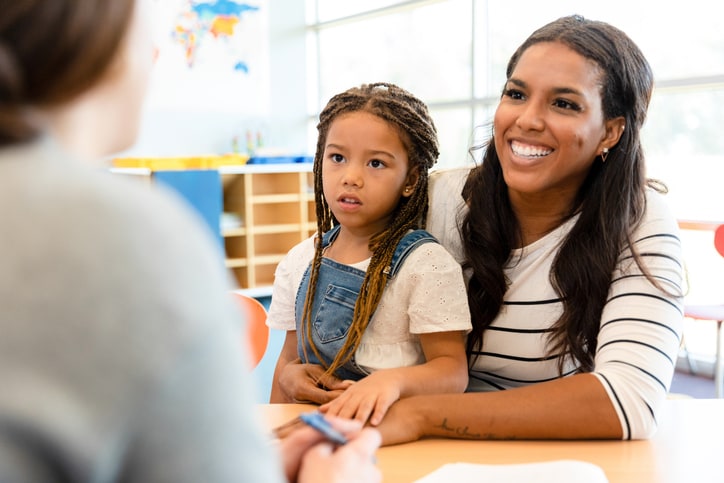By Conz Preti
I never really thought about what kind of parenting style I wanted to follow. To be honest, I kind of just go with the flow. Except on one front: we are raising our children bilingual (Spanish and English) so they can be more connected to my culture and also provide them the bilingual advantage my parents gave me when I was a little kid.
I come from a long lineage of immigrants. My four grandparents fled their countries for different reasons, landing in Argentina where they met, married and raised my parents. And then my mom and dad met and had me. When I was 5 years old, my parents packed our apartment and moved us to a new country for my dad’s career to flourish. We bounced around Latin America, and when I finished college, I moved to New York to try my luck.
That was 11 years ago, almost to the day.
In all the moving around, my parents kept one thing consistent: they sent me to international schools so I would have classes in the same language, English. This gave me a huge advantage. In fact, when I applied to grad school in the most prestigious journalism graduate program in New York, my test scores were impeccable.
I remember my classmates at grad school asking me why I didn’t have an accent at all — a question that has followed me everywhere in the last 11 years. Work colleagues, boyfriends, my now-husband’s friends, my in-laws. It’s as if some Americans can’t comprehend someone growing up speaking another language other than their mother tongue. The irony is that for me, I can’t comprehend someone growing up speaking only one language when there are so many of them across the world. To me, there’s no greater gift than being able to connect with someone in their own language and learn more about the different cultures through language (and food, always).
“It’s as if some Americans can’t comprehend someone growing up speaking another language other than their mother tongue.”
And not everyone was curiously nice about it.
Despite living in New York City, arguably one of the most diverses cities in the world, I experienced a lot of discrimination for simply speaking Spanish. Like that time when we were at a Mexican restaurant with a bunch of friends and I ordered tacos and elotes (as per their menu), and the bartender quickly snapped back with, “I don’t understand you. Speak English.” Or that time when I was on the phone with my parents and a stranger yelled, “Go back to Mexico!”
Still, I was determined to raise bilingual kids when the time came.
When I was pregnant with my first, my husband and I agreed to two things: 1) no repeated family names, and 2) I would only speak to our baby in Spanish. We failed with the first since we ended up giving him my grandad’s name as his middle; however, I did speak to our son in Spanish every single day. In fact, our son spoke Spanish before speaking English, making me the translator between him and our friends’ kids.
It was truly amazing to see our child develop his vocabulary in two languages at the same time. Seeing him making connections between words and knowing when to say which to whom. He would walk over to me with a picture book and say ‘fresa’ when I pointed to a strawberry and then switch languages when he was doing the same with my husband. There were words he only knew in Spanish (like ‘agua’ or ‘leche’), and it wasn’t until he started Montessori school, at 2.5 years old, that it finally clicked and he started using the English word for each. He needed to see other kids his age using it for his brain to understand how and when to switch.
“It was truly amazing to see our child develop his vocabulary in two languages at the same time.”
When our twins were born, we followed the same pattern. And although they are not verbal yet, they do follow directions in both languages, already proving that they absolutely understand what we are both saying to them.
What we do is pretty simple: my husband speaks to our kids in English, and I speak to them in Spanish. We have books in both languages, we sing songs in both languages, and we absolutely do not change languages even when in public.
“What we do is pretty simple: my husband speaks to our kids in English, and I speak to them in Spanish.”
Wherever I go, regardless of where I am, I speak to them in Spanish.
This has made for some uncomfortable situations. Like that one time when I was asked if I was my children’s nanny, despite my son yelling, ‘Mama, look!’ from the top of the big slide. I still wonder if that woman was genuinely curious or subtly trying to hint to me that I was not like her.
Now that we live in Maine, where Spanish is not heard as often on the streets as it was in Brooklyn, my interaction with my kids causes a lot of double takes. A LOT of them. Some positive: one Colombian mom did a double take at a national park and then smiled when hearing the familiar sounds. Others not so much: like when old people at the supermarket just stare at us, as if we were from a different planet.
But here’s the thing: I don’t care what people think about my family speaking in Spanish.
“I don’t care what people think about my family speaking in Spanish.”
I won’t stop talking to my children in Spanish because some random person at checkout is annoyed that they can’t understand what I’m telling them (which is always simple commands or loving words). My focus is not on them; it’s on my children and their future. I am opening the doors to their world even wider, allowing them to be able to communicate with and explore more diverse cultures, countries and entertainment, you name it. I am raising my children to also be accepting of those who are different, who come from different places, whose race and identity is far more complex, like mine is, than being from a single town, state or country.
I’m fully prepared for the tween and teen years of rolling eyes and moaning “Mooooooom” when I embarrass them in front of friends with my Spanish. But I also will be waiting patiently for them to be thankful one day for all the doors being bilingual will open for them. Just like it happened to me.
Conz Preti is an Argentine journalist and mom of three under 4. She’s worked in digital journalism for over a decade now, and her byline can be found in many of the popular websites millennials read regularly. She’s the author of “Too Pregnant To Move” and her weekly newsletter Modern Motherhood.





